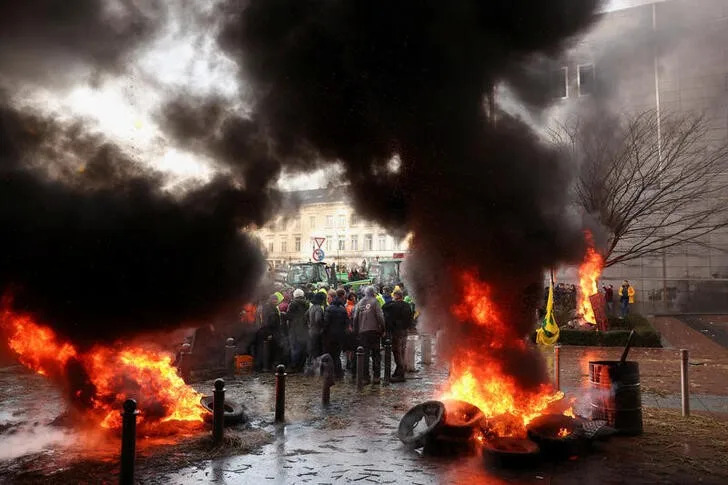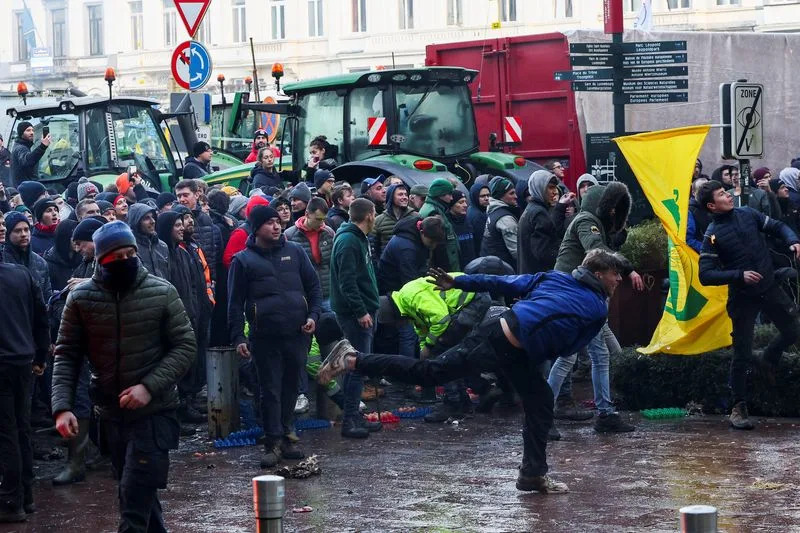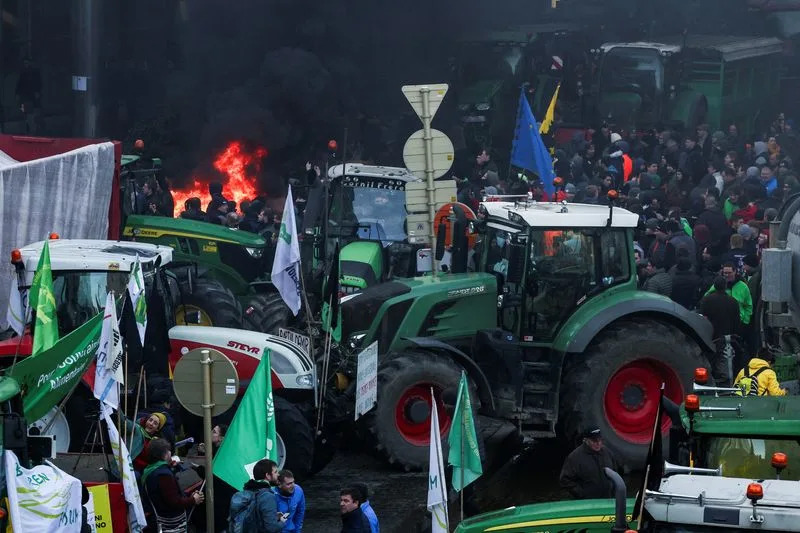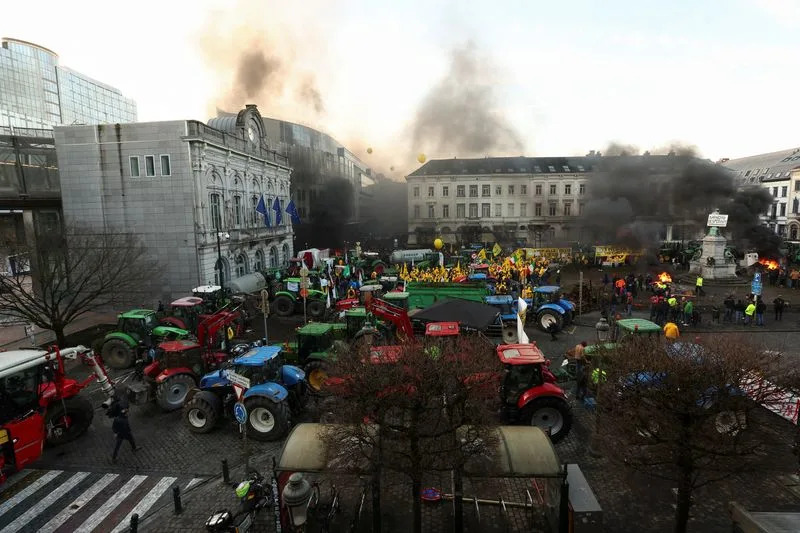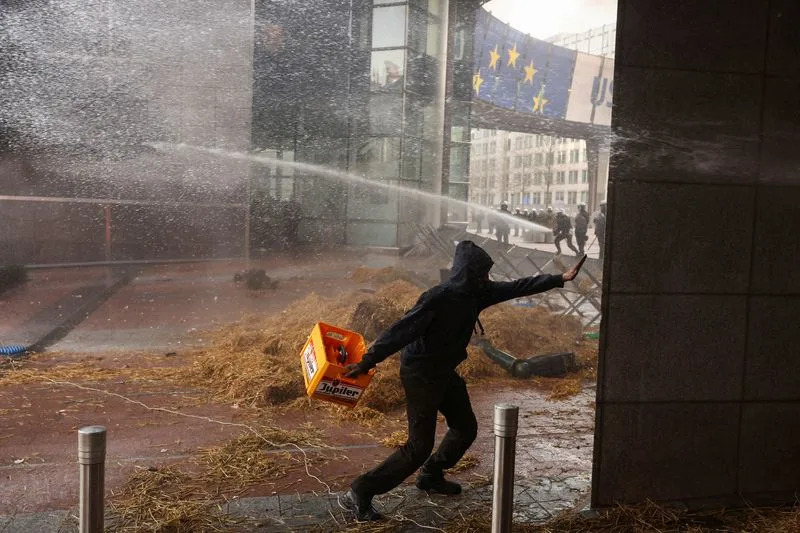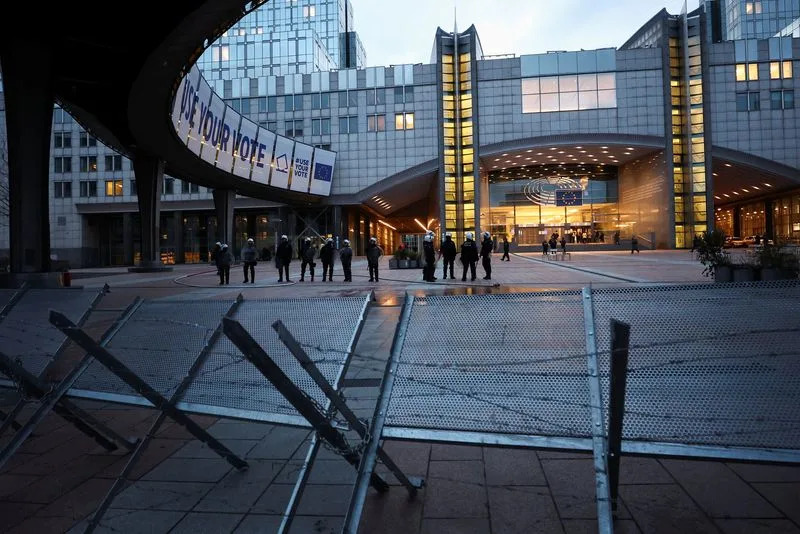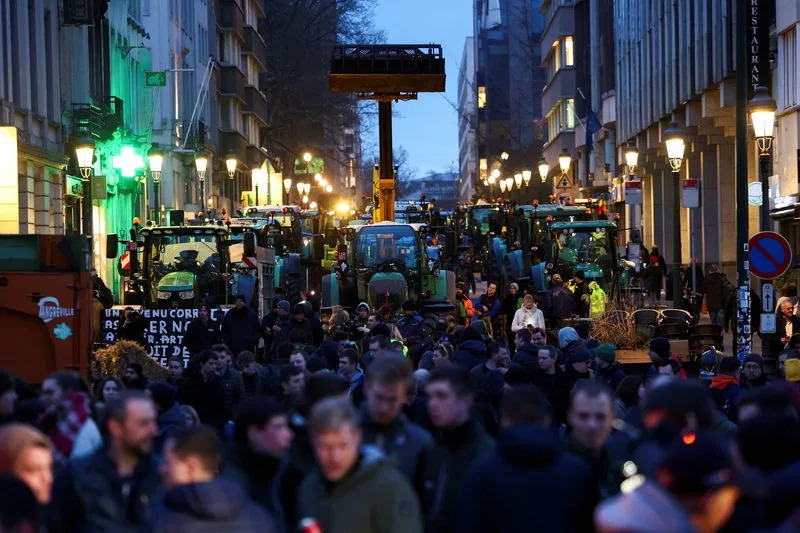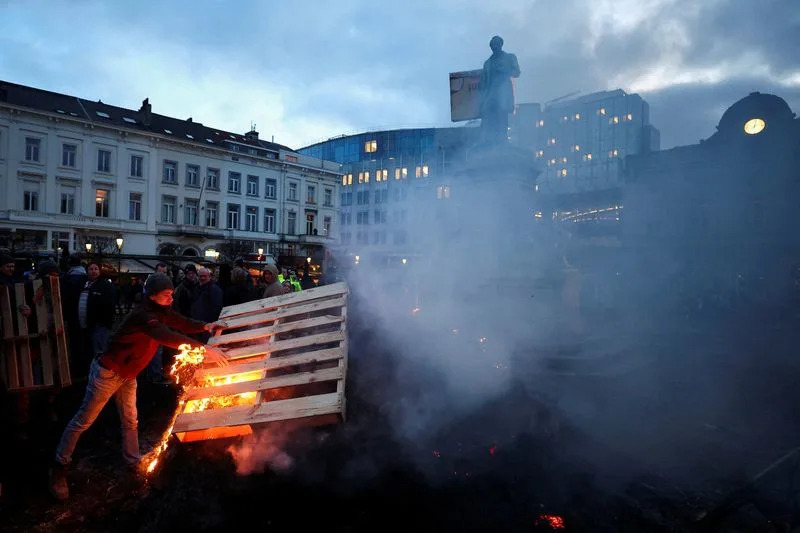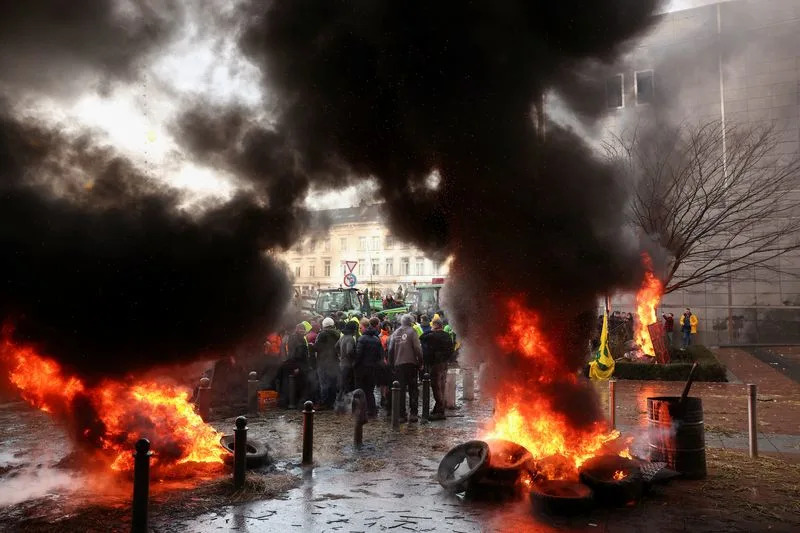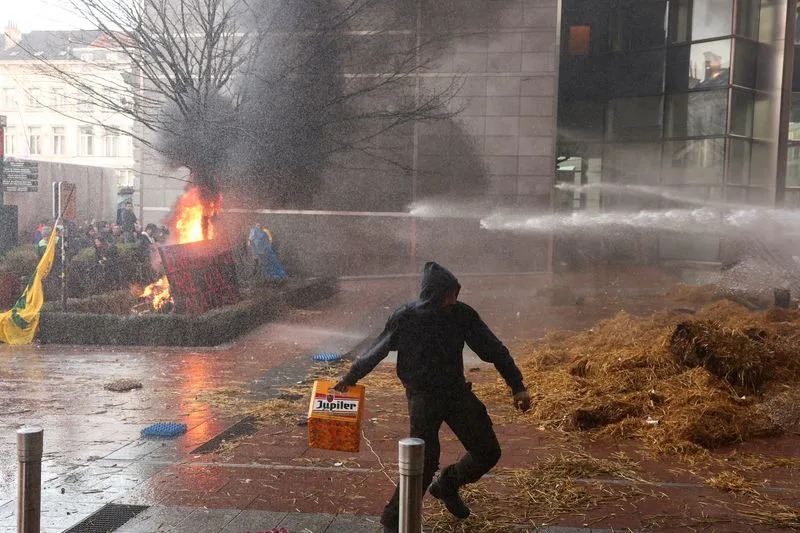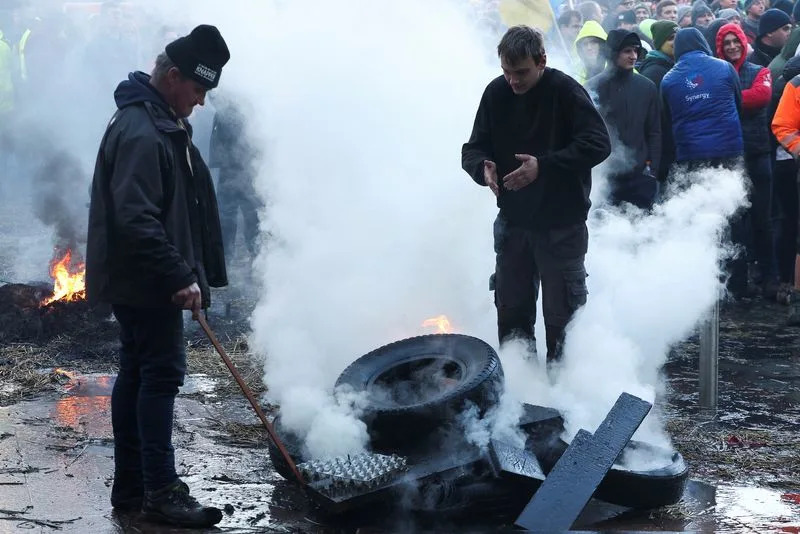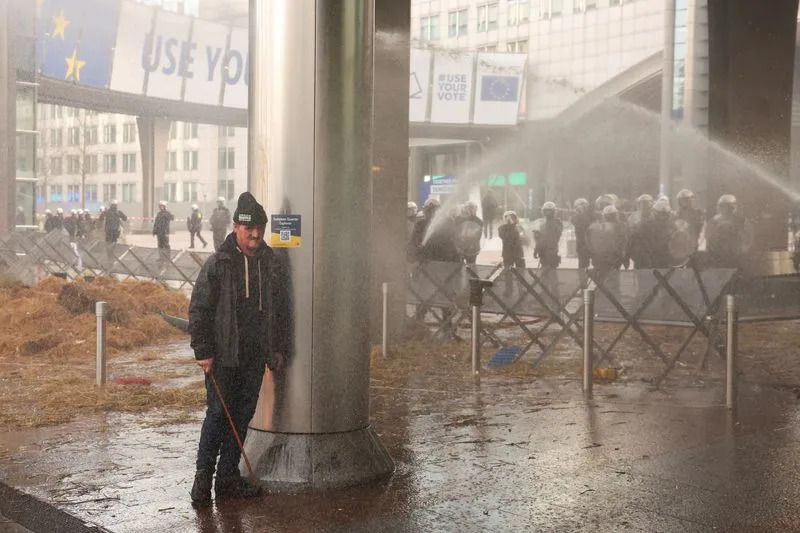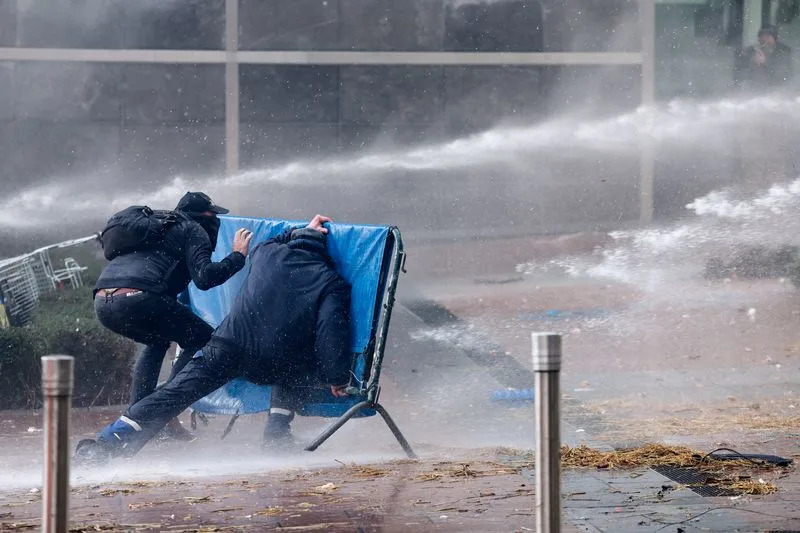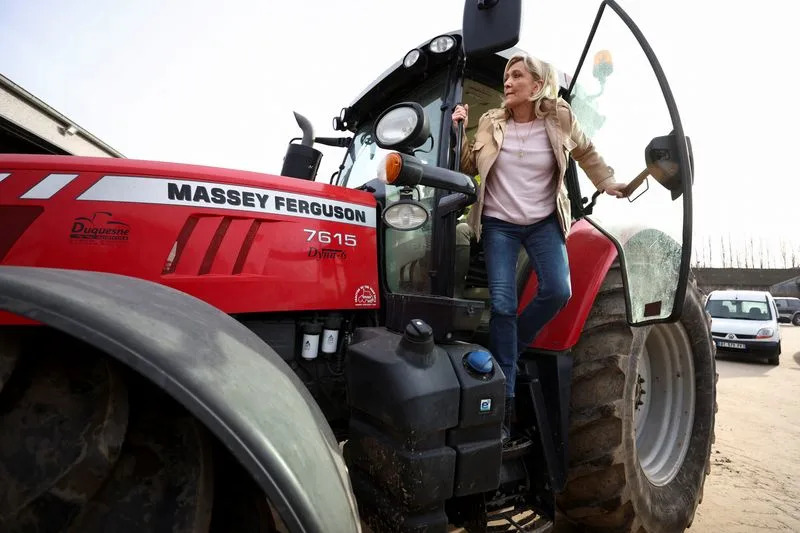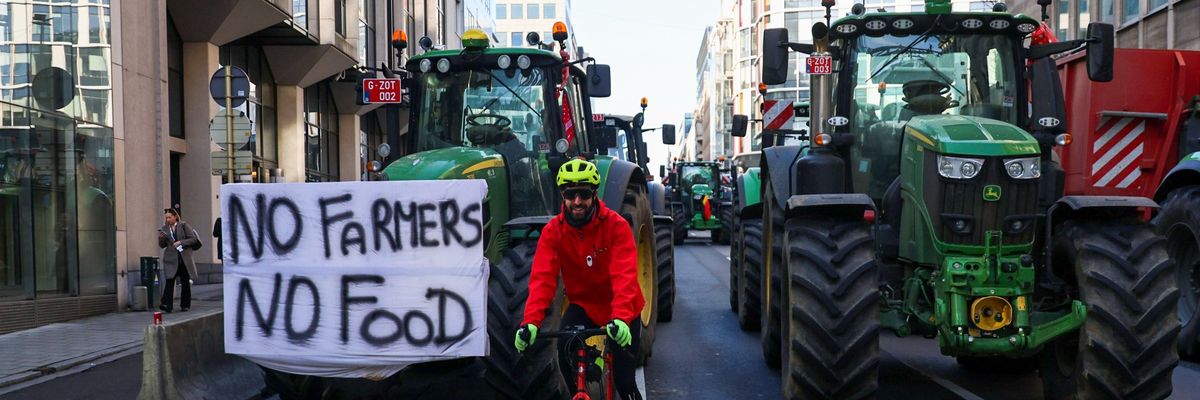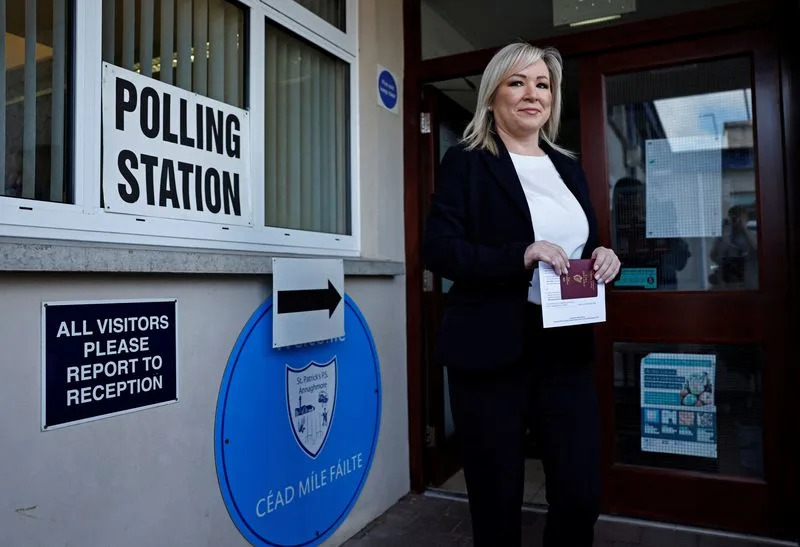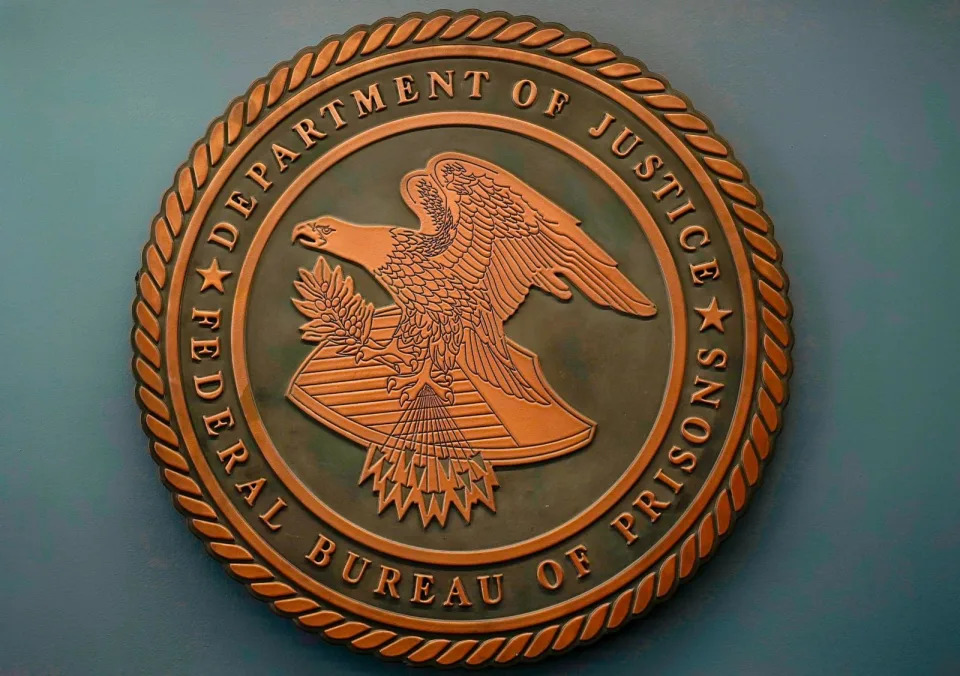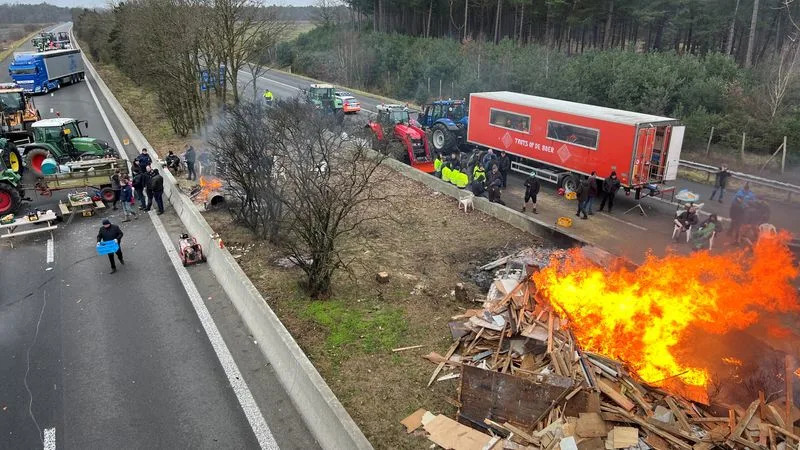
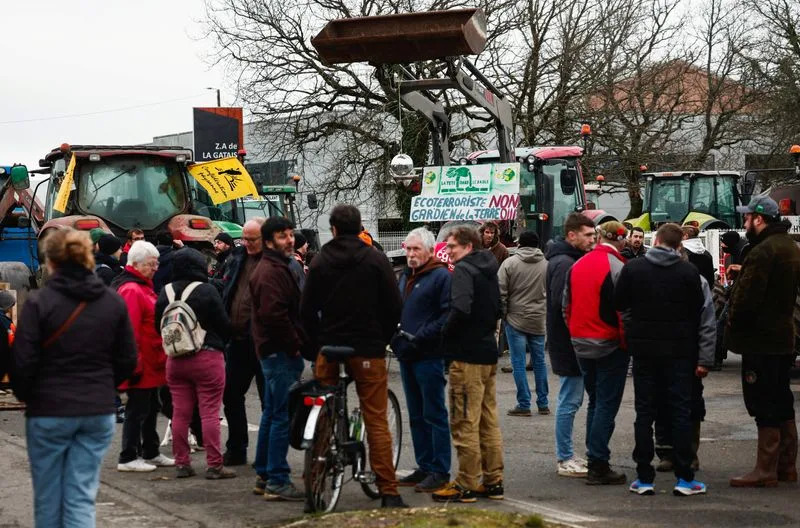
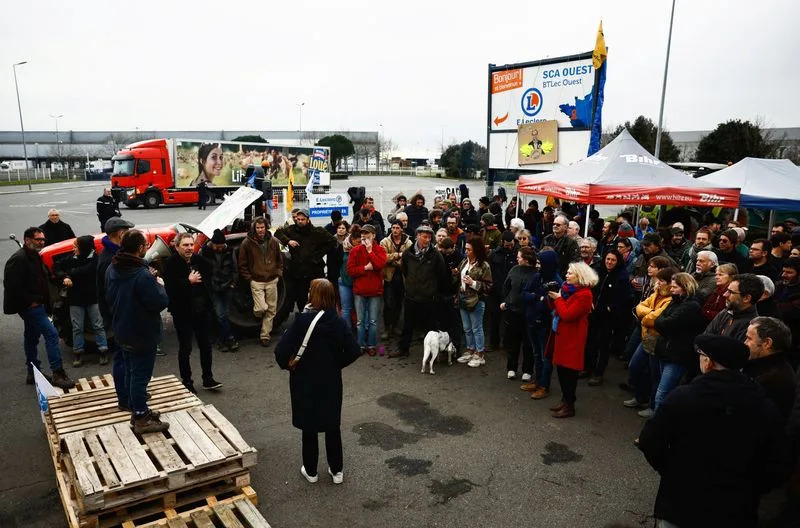
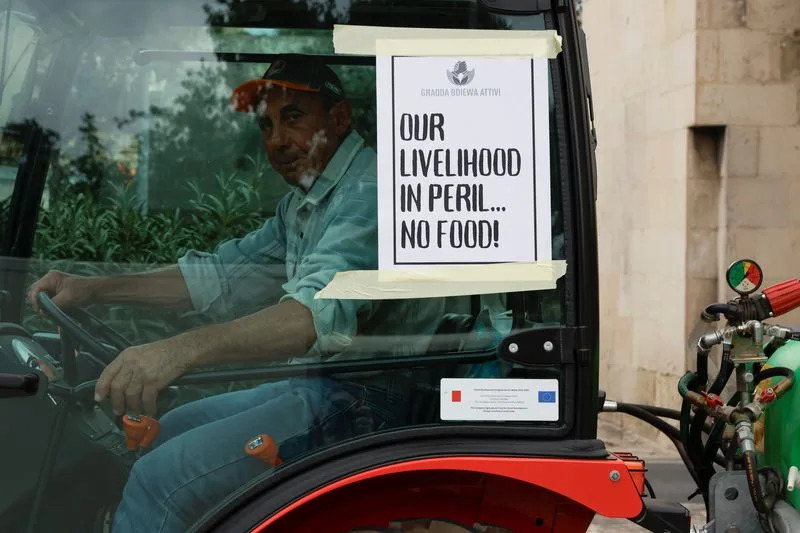
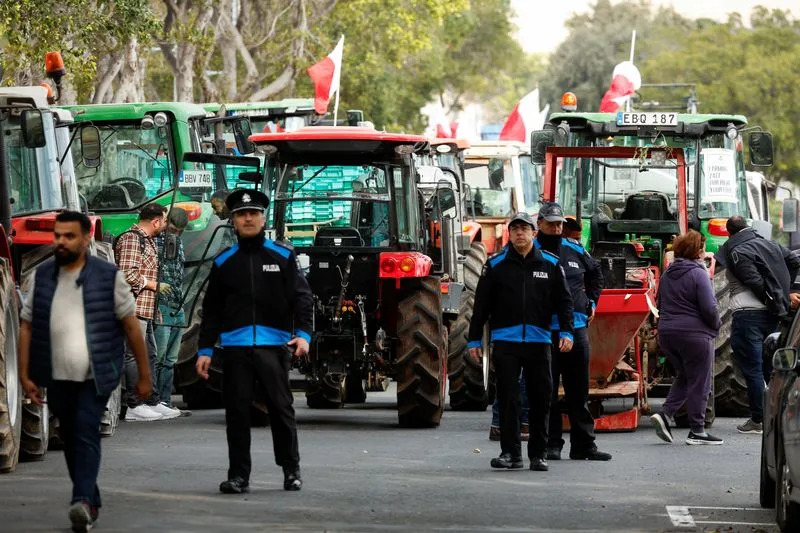
Protest against European agricultural policies, in Floriana
By Charlotte Van Campenhout and Christian Levaux
BRUSSELS (Reuters) -Farmers blocked the Dutch-Belgian border and occupied roads in Greece on Friday, while a Polish union announced plans to shut border crossings with Ukraine as European protests over prices and red tape spread.
Protests have erupted in several countries, exposing anger about low prices for produce, rising costs, cheap imports and constraints imposed by the EU's drive to fight climate change.
While French farmers started lifting blockades after the government made further concessions, Belgian and Dutch farmers blocked motorway border crossings. A government traffic website showed that blockades on three key motorways remained in place on Friday evening.
At one roadblock, Dutch pig farmer Johan Van Enckevort, 25, warned the European Union and Dutch politicians holding cabinet formation talks not to ignore farmers' needs.
"We have very nice products here in the EU and we want to continue to make those products. But it has to be done in a fair way, in a decent way and not with so many rules. It just can't go on like this," he said.
The frustration came to a head in Brussels this week, where farmers threw eggs and stones at the European Parliament and set off fireworks, demanding EU leaders at a nearby summit do more.
"The Common Agricultural Policy (CAP) has gradually become a Common Ecological Policy, without any recognition for us food producers," Belgian farmers union ABS said in a statement.
European Commission spokesperson for Trade and Agriculture Olof Gill said the Commission's support for the agricultural sector is a constant of the EU and that for the 2023-2027 period, more than 300 billion euros will be distributed to European farmers as part of the CAP.
"Our support is commensurate with the contribution of European farmers to our food sovereignty," he said, adding that due to specific concerns raised by farmers, the Commission is assessing possible next steps.
At the Belgian port of Zeebrugge - which handles car imports and some fresh produce from Britain and elsewhere - farmers on Friday evening started breaking up a blockade that began on Wednesday and has left 2,000 trucks backed up outside.
Carmakers sending deliveries through Zeebrugge include Tesla, BMW, Mercedes, Hyundai and Volvo.
The port said it would now focus on bringing the trucks to the port or a temporary parking area at the Ostend airport.
Polish farmers' union Solidarity on Friday announced a general strike starting on Feb. 9 with a blockade of border crossings between Poland and Ukraine.
"Our patience has run out," it said, referring to the import of Ukrainian produce.
Polish media reported that German farmers, supported by Polish farmers, were blocking parts of the border with Poland.
Farmers have also set up blockades in the centre and north of Greece, calling for a permanent exemption on diesel taxes and faster compensation for flood-related losses.
In Portugal, where tractors blocked at least three roads linking Portugal to Spain on Thursday, one road in the southern region of Alentejo near the border remained blocked on Friday and farmers staged slow marches in several places.
Spanish farmers said earlier this week they would take to the streets in February in protest against European regulations and lack of government support.
French farmers, meanwhile, were on Friday dismantling roadblocks at dozens of sites, including several highways leading into Paris, after receiving more government pledges.
"The worst of the crisis is now behind us, but the issues we have to deal with now are ahead of us," French Agriculture Minister Marc Fesneau said on CNEWS TV.
The French farmers said President Emmanuel Macron's government now needed to act fast on its pledges, which have included scrapping plans to reduce tax discounts on tractor diesel, an easing of pesticide regulations, a pause on new fallow land rules, and more safety checks on food imports.
Guillaume Chantereau, 31, who grows cereals and raises chickens for eggs, said a lot of work was waiting for him at the farm, but he would be back if the government does not deliver.
"For now, we ease off, but we will not give up. We are used to hearing nice speeches, and these are not always respected, so better watch out," he said.
(Reporting by Charlotte Van Campenhout, Piotr Lipinski and Christian Levaux in Belgium, Noemi Olive in France, Anna Wlodarczak-Semczuk in Poland and Andrey Khalip and Patricia Rua in Portugal; Writing by Geert De Clercq; Editing by Varun H K, Jamie Freed, Emelia Sithole-Matarise and Alexander Smith)
Farmers are blocking key roads between Belgium and the Netherlands in the latest sign of their anger
Associated Press Finance
Fri, February 2, 2024





Belgium EU Summit
People shout slogans during a protest by farmers outside the European Parliament as European leaders meet for an EU summit in Brussels, Thursday, Feb. 1, 2024. European Union leaders meet in Brussels for a one day summit to discuss the revision of the Multiannual Financial Framework 2021-2027, including support for Ukraine. The board on the right reads in French: "Help us to be sustainable".
BRUSSELS (AP) — Farmers parked their tractors across key road crossings on the border between Belgium and the Netherlands on Friday in their latest protest against excessive red tape and competition from cheap imports.
The roadblocks, mainly by Belgian farmers with support of some Dutch colleagues, choked highways that are vital transport routes for freight from the major European ports of Antwerp and Rotterdam. They were set up after a day of chaos Thursday in Brussels, where angry farmers torched hay bales and threw eggs and firecrackers at police near a summit of European Union leaders.
While blockades sprang up on the Belgian-Dutch border, they were gradually easing around Paris and elsewhere in France after the French government on Thursday offered over 400 million euros ($436 million) in various measures. In Germany, however, lawmakers on Friday approved cuts to fuel subsidies for farmers that have prompted angry protests there.
Jan Jambon, the prime minister of Belgium's Flemish region, pledged to help the agriculture sector.
“We are going to see what we can reasonably do. But basically, I have a lot of sympathy for their complaints. We are now going to see how we can make that concrete," he told Belgian broadcaster VTM.
EU leaders on Thursday showered the farmers with compliments and compassion — but few concrete proposals to address their problems.
Farmers complain that it’s becoming harder than ever to make a decent living as energy and fertilizer costs surge because of Russia’s war in Ukraine, more and cheaper farm imports enter Europe, and climate change-fueled droughts, floods or fires wreck their crops.
EU Commission chief Ursula von der Leyen pledged Thursday to swiftly prepare new plans to slash red tape so that farmers can spend more time in their fields and less in their offices.
Many EU leaders also said they would not approve a trade deal with South American nations that is under consideration unless any imports would meet the same regulatory standards that EU farmers face, a key demand from the sector.
Angry farmers invade the streets of Brussels as EU leaders meet over Ukraine
Euronews
Thu, February 1, 2024

Angry farmers invade the streets of Brussels as EU leaders meet over Ukraine
Belgian farmers took a prominent stance by blocking the city center with their tractors, and their counterparts from Italy and other EU member states swiftly joined the demonstration.
This cross-border solidarity underscores the widespread frustration among European farmers, who are are fuelled by anger over low incomes, rising costs, and regulations associated with EU environmental policies.

Anti riot police officers stand guard in a closed security area outside the European Parliament during a protest by farmers as European leaders meet for an EU summit - Thomas Padilla/Copyright 2024 The AP. All rights reserved
The ongoing EU summit, initially intended to focus on aid for Ukraine, has been overshadowed by the farmers' protests. While the demonstrators are aiming to compel EU leaders to address their concerns.
The EU offered to shield farmers from cheap Ukrainian imports and proposed a delay in the implementation of new ecological measures. However, these concessions have not been sufficient to appease the protesters who are demanding further relief.
Finding a balance between supporting farmers and adhering to environmental goals poses a significant challenge for EU leaders.
Farmers’ protests cast shadow over Brussels summit talks
DPA
Thu, February 1, 2024

A farmer throws an egg during a protest in the European district, organized by several agriculture unions from Belgium and other European countries, as they demand better conditions to grow, produce and maintain a proper income.
As EU leaders met in Brussels to discuss financial aid to Ukraine on Thursday, outside, farmers were continuing days of protests that have seen tractors block traffic into the Belgian capital.
Brussels police say around 1,300 tractors have descended on the city since Wednesday. Farmers burnt tires and tore down a statue in a square close to the European Parliament on Thursday.
The farmers’ grievances include burdensome EU regulations and competition from cheaper Ukrainian agricultural imports, for which trade tariffs are currently suspended.
Hungarian Prime Minister Viktor Orbán was photographed on Wednesday evening talking to a protester.
Orbán spokesman Zoltán Kovács said in a post on X, formerly known as Twitter, that Orbán said "the EU Commission should represent the interests of European farmers against those of Ukraine, not the other way around."
Orbán had been at the centre of the specially convened summit because he was the only EU leader threatening to use his veto power to block additional funding for the Ukrainian war effort. On Thursday, the leaders including Orbán reached agreement on the funding.
Commenting on the protests in a press conference on Thursday, European Commission President Ursula von der Leyen said that "I'm very sensitive to the message that farmers are concerned by administrative burden." She promised to propose new measures to "work on reducing these administrative burdens."
EU leaders also discussed the protests at a dinner on Wednesday evening, Irish Prime Minister Leo Varadkar told reporters.
“I'd be among one of quite a number of heads of government here who understand the pressures that our farmers are under,” Varadkar said on Thursday. “Whether it's increased energy costs or fertilizer costs, new environmental regulations—it’s kind of been layer on layer for farmers.”

Rows of tractors can be seen in the Belliard street during a protest in the European district, organized by several agriculture unions from Belgium and other European countries, as they demand better conditions to grow, produce and maintain a proper income. Hatim Kaghat/Belga/dpa

A farmer throws an egg during a protest in the European district, organized by several agriculture unions from Belgium and other European countries, as they demand better conditions to grow, produce and maintain a proper income. Dirk Waem/Belga/dpa
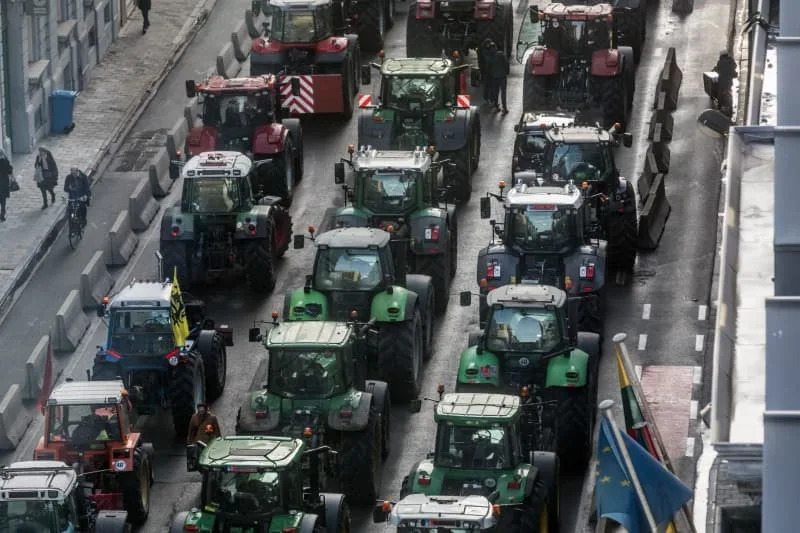
Rows of tractors can be seen in the Belliard street during a protest in the European district, organized by several agriculture unions from Belgium and other European countries, as they demand better conditions to grow, produce and maintain a proper income. Hatim Kaghat/Belga/dpa
French farmers' union call for end of blockades as anger spreads in Europe
Thu, February 1, 2024
BRUSSELS/PARIS (Reuters) -Two of France's main farming unions on Thursday urged protesters who have staged hundreds of tractor blockades across the country to go back home, after the government announced measures to try to quell the anger in a movement that has spread across Europe.
While some local grievances vary, the unrest, also seen in Belgium, Portugal, Greece and Germany, has exposed tensions over the impact on farming of the EU's drive to tackle climate change, as well of opening the door to cheap Ukrainian imports to help Kyiv's war effort.
Farmers' complaints across Europe include being choked by green rules, taxes, rising costs and unfair competition from abroad.
The frustration came to a head in Brussels earlier in the day, where farmers threw eggs and stones at the European Parliament, and started fires and set off fireworks as they demanded EU leaders at a summit nearby do more to help them.
"We want to stop these crazy laws that come every single day from the European Commission," Jose Maria Castilla, a farmer representing the Spanish farmers' union Asaja, said in Brussels.
With the call from some of the French unions, the question now is whether farmers will they lift their blockades in France - and what will happen to protests that have spread across Europe.
FRENCH PLEDGES
The French farmers had stepped up their tractor protests from Monday after more than two weeks of demonstrations. Wary of further escalations, the government promised on Thursday to offer them more protection, including by better controlling imports and giving farmers extra aid.
"Everywhere in Europe the same question arises: how do we continue to produce more but better? How can we continue to tackle climate change? How can we avoid unfair competition from foreign countries?," Prime Minister Gabriel Attal said, as he announced the new measures in Paris.
In response to the array of pledges, Arnaud Rousseau, of France's main farmers union FNSEA said it was "time to go home" and lift the blockades.
Arnaud Gaillot of the Young Farmers' union said the same. But both warned that other types of protests would continue - and that they would take back to the streets if the government did not follow on its promises.
EU LEADERS MEET FARMERS
The protests across Europe come as the far right, for whom farmers represent a growing constituency, is seen making gains in June's European Parliament elections.
In Brussels, European Commission chief Ursula von der Leyen and Belgium Prime Minister Alexander De Croo - who holds the EU's rotating presidency - were set to meet the European farmers' lobby COPA-COGECA after the summit of EU leaders.
Von der Leyen said the European Commission would work with Belgium on a proposal to reduce farmers' administrative burdens.
"To the farmers that are outside. We see you and we hear you," European Parliament President Roberta Metsola said.
Small groups had tried to tear down the barriers erected in front of the parliament - a few blocks from where the summit was taking place - but police fired tear gas and sprayed water at the farmers with hoses to push them back.
A statue on the square was damaged. Security personnel in riot gear stood guard behind barriers where the leaders were meeting at European Council headquarters.
The pockets of unrest diminished during the day and the tractors began leaving in the afternoon.
Farmers have already secured several measures, including the bloc's executive Commission proposals to limit farm imports from Ukraine and loosen some environmental regulations on fallow lands, which several EU leaders welcomed as they arrived at the summit.
And Irish Prime Minister Leo Varadkar echoed French President Emmanuel Macron's opposition to signing a trade deal with the Mercosur group of South American countries in its current form - another key demand for farmers. But German Chancellor Olaf Scholz reiterated his support for the deal.
SUPPLY CHAIN IMPACT
Farmers across Europe staged protests during the day.
In Portugal, farmers used tractors to block at least three roads linking their country to Spain.
Hundreds of Greek farmers with black flags - to symbolise what they say is the death of agriculture - drove their tractors across the centre of Greece's second-biggest city Thessaloniki.
"No farmers, no food, no future" one banner read. One tractor was carrying a black coffin.
"We hope to shake them up (with our protest), we hope they are frightened and change the laws they have enacted," farmer Vassilis Kanods said.
At a protest in Italy, a tractor carried a sign reading: "You are destroying our future."
Meanwhile, one of Belgium's biggest supermarket chains Colruyt said on Thursday three of its distribution centres were blocked by protesting farmers, leading to disruptions in its supply chain.
Belgian media reported that 1,400 trucks were stuck at the port of Zeebrugge, blocked by farmers.
In France, Eric Hemar, the head of a federation of transport and logistics employers, said delays had cost transport firms about 30% of their revenues over the past 10 days.
(Reporting by Johnny Cotton, Yves Herman, Kate Abnett, Phil Blenkinsop, Erol Dogrudogan, Petra Wischgoll, Julia Payne in Brussels, Geert De Clercq, Nicolas Delame, Elizabeth Pineau, Tassilo Hummel and Kate Etringer in Paris, Piotr Lipinski in Gdansk, Catarina Demony in Lisbon, Angeliki Koutantou and Lefteris Papadimas in Athens, Alexandros Avramidis in Thessaloniki, Charlotte van Campenhout in Amsterdam; Writing by Ingrid Melander; Editing by Alison Williams)
